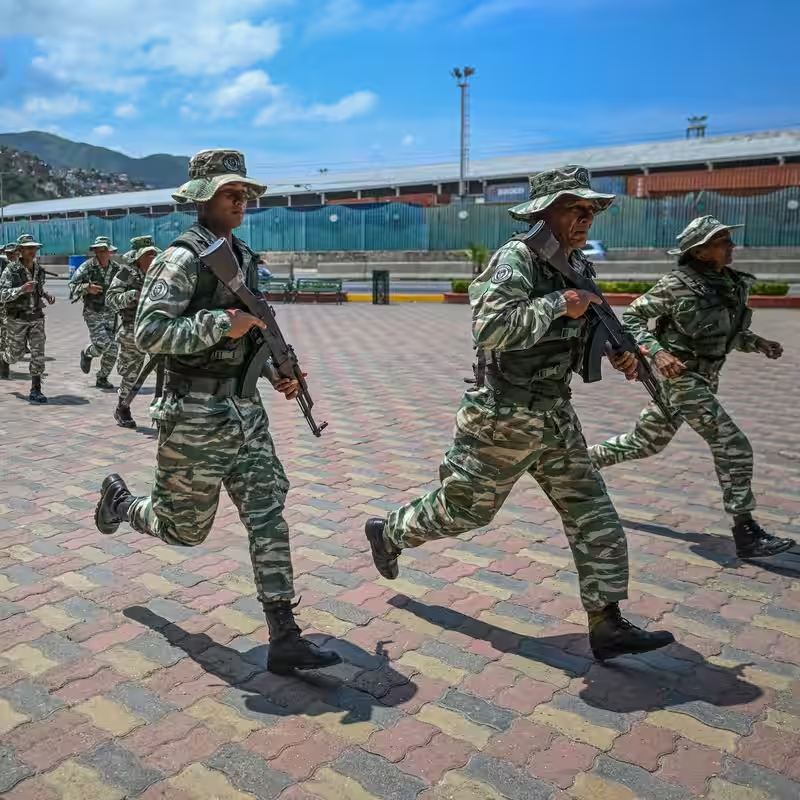Table of Contents
- Venezuela Declares National Defense Alert
- U.S. Military Campaign in Caribbean Intensifies
- Maduro’s Call for Civilian Militias
- Can Venezuela Really Resist U.S. Power?
- How Venezuelans Are Reacting
- Why This Matters Globally
- Sources
Venezuela Declares National Defense Alert
In a dramatic escalation of rhetoric and readiness, Venezuela has launched sweeping military exercises and activated new defense zones across the country. President Nicolás Maduro, flanked by top generals, urged citizens to “defend the homeland” as tensions with the United States reach a boiling point.
Defense Minister Vladimir Padrino López issued a stark warning this week: “Prepare for the worst.” State television has since aired footage of civilians crawling through mud with rifles, practicing river crossings, and participating in evacuation drills—signaling a shift from symbolic drills to what analysts call “operationally relevant” preparations.
U.S. Military Campaign in Caribbean Intensifies
The Venezuelan mobilization comes in direct response to a sharp uptick in U.S. military activity in the region. American forces have conducted a series of operations targeting alleged drug trafficking networks, resulting in dozens of deaths. While publicly framed as anti-narcotics missions, U.S. officials have privately acknowledged a broader objective: pressuring the Maduro regime toward collapse.
Adding fuel to the fire, former President Donald Trump recently told Congress the U.S. is in a formal “armed conflict” with certain transnational cartels—a statement Maduro’s government interprets as a veiled threat of intervention.
Maduro’s Call for Civilian Militias
Venezuela claims it has millions of civilian combatants ready to resist foreign aggression. In La Guaira this week, Interior Minister Diosdado Cabello presided over the swearing-in of a “peasant militia,” declaring: “Anyone who thinks this is resolved by dropping two bombs doesn’t know us.”
However, experts say these militias are largely drawn from government-aligned groups—members of the ruling socialist party, local food distribution committees, and neighborhood collectives—rather than representing broad public mobilization.
Can Venezuela Really Resist U.S. Power?
Despite the fiery rhetoric, defense analysts are skeptical. “Venezuela’s military equipment was designed for internal control or regional skirmishes—not to counter a full-scale U.S. invasion,” said Andrei Serbin Pont, president of Latin American research group CRIES.
He added: “You can’t resist conventional U.S. military power with outdated tanks and propaganda drills.” While Venezuela possesses significant arms stockpiles, much of its hardware is aging and poorly maintained due to years of economic crisis.
How Venezuelans Are Reacting
Public sentiment remains divided. Some loyalists echo Maduro’s nationalist fervor, but many ordinary citizens are exhausted by years of scarcity and instability. “As long as I can put bread on the table, I don’t care,” said one Caracas resident who asked not to be named.
Others speculate that a U.S. intervention might even be welcomed—especially among younger generations disillusioned with the current regime.
Why This Matters Globally
The Venezuela-U.S. standoff isn’t just regional—it’s geopolitical. With China and Russia maintaining strategic ties to Caracas, any direct U.S. action could trigger wider diplomatic fallout. Meanwhile, the humanitarian crisis continues, with over 7 million Venezuelans having fled the country since 2015.
For now, Maduro’s military theater appears aimed less at actual defense and more at rallying domestic support amid growing isolation.




